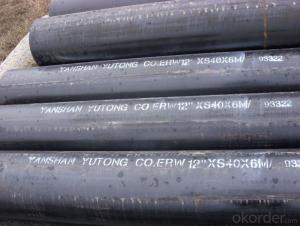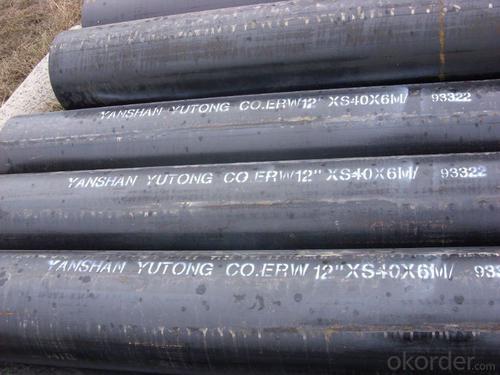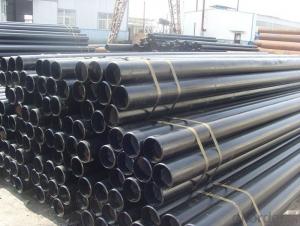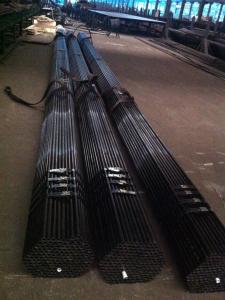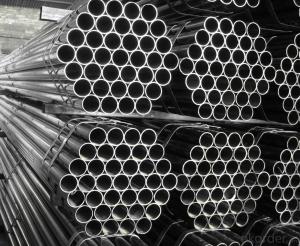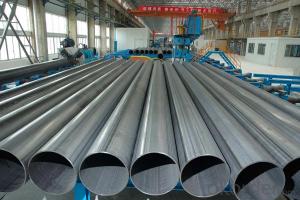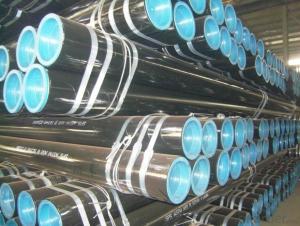ASTM A53 Gr.B Seamless Steel Pipe
- Loading Port:
- China Main Port
- Payment Terms:
- TT OR LC
- Min Order Qty:
- -
- Supply Capability:
- -
OKorder Service Pledge
OKorder Financial Service
You Might Also Like
O.D | O.D tolerance | W.T | Thickness Tolerance |
1/2-12'' | ±0.3mm | 1.5-12 MM | ±8% |
Length | 3m,4m,5.8m,6m or according customers' requirements | ||
Certificate | ISO9001-2008,EN10210,API,Raw material cert,Mill cert,Reap on site inspection report,SGS,BV | ||
Standard | ASTM A53/ASTM A36 BS1387/BS1139/EN39/EN10219/EN10217/EN10297/EN10296/EN10025 etc | ||
Material | Q195/215/235/345, SS330/400/500, S235JR/S235JQ/S235J2, etc | ||
Inspection | With Hydraulic Testing, Eddy Current , Infrared Test, etc | ||
Technique: | Welded Hot rolled,heat extrusion | ||
Packing | in bundle or in bulk, PVC in blue or in strip | ||
Usage | For construction, Pluid and Greenhouse | ||
Main market: | Middle east,North and South America, East and West Europe, South and southeast Asia,Australia,Africa, | ||
Place of Origin | China | ||
HS code: | 73063090 | ||
Productivity | 2000Ton/Month | ||
Processing | galvanzied,inner and outer stab clean,bevelled oiled,painted black threading,with coupling and plastic caps protected packing in plastic cloths,3PE,FBE,corrosion resistant coating | ||
- Q: How are steel pipes threaded?
- Threading, a process that involves creating screw-like grooves on the outer surface of steel pipes, enables their connection to other pipes or fittings using threaded connections. Steel pipes can be threaded through various methods, including manual threading, electric threading machines, and hydraulic threading machines. Manual threading employs a handheld pipe threading tool called a die. The die is positioned on the outside of the pipe, and while pressure is applied, the pipe is rotated to generate the threads. This technique is suitable for smaller diameter pipes and is commonly used for on-site repairs or in smaller operations. For larger diameter pipes, electric threading machines are commonly used. These machines consist of a motor-driven spindle that rotates the pipe and a die head that houses the threading dies. The operator simply feeds the pipe into the machine, and the threading dies automatically cut the threads onto the pipe. Hydraulic threading machines, similar to electric threading machines, utilize hydraulic power to rotate the pipe and create the threads. These machines are typically employed for larger diameter pipes or heavy-duty applications. Irrespective of the method employed, it is crucial to properly prepare the pipe before threading. This may involve cleaning the pipe, eliminating any burrs or sharp edges, and applying a lubricant to minimize friction during the threading process. In conclusion, threading is a widely used and efficient technique for establishing threaded connections on steel pipes. It facilitates easy assembly and disassembly of pipes and fittings, making it a popular choice in industries such as plumbing, construction, and oil and gas.
- Q: Can steel pipes be used for transportation of hazardous materials?
- Steel pipes can indeed be used for the transportation of hazardous materials. Steel is known for its strength, durability, and resistance to corrosion, making it suitable for handling and transporting a wide range of hazardous substances. This includes flammable liquids, toxic chemicals, and other dangerous materials. Steel pipes used for the transportation of hazardous materials are often specially designed and constructed to meet stringent safety regulations and industry standards. They are typically made from high-quality steel alloys and undergo rigorous testing to ensure their integrity and resistance to leaks or ruptures. Furthermore, steel pipes can be manufactured with additional protective coatings or linings to provide an extra layer of security and prevent any potential reactions between the hazardous material and the steel. These coatings can also help to minimize the risk of corrosion and extend the lifespan of the pipes. Overall, steel pipes have a proven track record in the transportation of hazardous materials due to their inherent strength, durability, and ability to withstand the harsh conditions often encountered during transportation. However, it is crucial to follow proper handling, storage, and transportation protocols to ensure the safety of both the materials being transported and the individuals involved in the process.
- Q: What are the different methods of measuring the thickness of steel pipes?
- There are several methods of measuring the thickness of steel pipes, including ultrasonic testing, magnetic particle testing, eddy current testing, and laser scanning.
- Q: What is the maximum bending radius for steel pipes?
- The maximum bending radius for steel pipes is determined by several factors, including the diameter of the pipe, the thickness of its walls, and the specific type of steel used. In general, pipes with larger diameters and thicker walls will have a greater maximum bending radius. However, it is crucial to adhere to industry standards and guidelines to ensure that the structural integrity of the pipe remains intact during the bending process. To obtain precise details regarding the maximum bending radius for steel pipes in various applications, it is recommended to consult the manufacturer's specifications or refer to relevant codes and standards, such as the American Society of Mechanical Engineers (ASME) B31.1 or B31.3.
- Q: The difference between carbon and welded steel tubes
- Quality solutionsThe carbon steels we usually refer to include carbon structural steels and carbon tool steelsThe common steel pipe is divided into two kinds: seamless steel pipe and welded steel pipe. The welded pipe of small size is straight welded, and the big size steel pipe is usually spiral welded
- Q: What steel pipes are buried for outdoor heating pipes? Seamless or welded tube? Are there any rules for specific countries? Can use the seamed tube?
- The pipe material of heating pipe network should be designed according to the requirement. When the design is not specified, the following requirements shall be met:1 when the pipe diameter is less than or equal to 40mm, welded steel pipe shall be used.2 when the pipe diameter is 50 ~ 200mm, welded steel pipe or seamless steel pipe shall be used.3 when the pipe diameter is greater than 200mm, spiral welded steel pipe shall be used.
- Q: What's the difference between steel pipe and pipe fittings?
- Steel: steel pipe is a hollow steel strip, used as pipe conveying fluid, such as oil, gas, water, gas, steam, in addition, the bending and torsional strength of the same, the weight is light, so it is widely used in the manufacture of machinery parts and engineering structures. It is also used to produce all kinds of conventional weapons, guns, shells and so on.
- Q: What's the use of steel pipe?
- Steel pipe is not only used to transport fluid and powder solid, exchange heat energy, and manufacture mechanical parts and containers, but also is an economic steel. It can reduce weight and save 20 to 40% of metal by using steel pipe to make building structure, network frame, prop and mechanical support. Moreover, it can realize factory mechanization construction. (
- Q: How do you repair a damaged steel pipe?
- To repair a damaged steel pipe, the first step is to identify the extent of the damage. If the damage is minor, it can be fixed using a pipe repair clamp or a stainless-steel wrap. For larger damages, a cut and replace method may be necessary, where the damaged section is cut out and replaced with a new piece of pipe. In some cases, welding or soldering techniques may be required. It is important to consult with a professional plumber or pipe repair specialist to ensure the correct repair method is used for the specific situation.
- Q: What are the advantages of using steel pipes over other materials like PVC or copper?
- There are several advantages of using steel pipes over other materials like PVC or copper. Firstly, steel pipes have superior strength and durability, making them suitable for high-pressure applications and extreme weather conditions. Secondly, steel pipes have excellent corrosion resistance, ensuring a longer lifespan compared to PVC or copper. Additionally, steel pipes offer better fire resistance, making them safer for certain applications. Lastly, steel pipes have higher thermal conductivity, allowing for efficient heat transfer.
Send your message to us
ASTM A53 Gr.B Seamless Steel Pipe
- Loading Port:
- China Main Port
- Payment Terms:
- TT OR LC
- Min Order Qty:
- -
- Supply Capability:
- -
OKorder Service Pledge
OKorder Financial Service
Similar products
Hot products
Hot Searches
Related keywords
